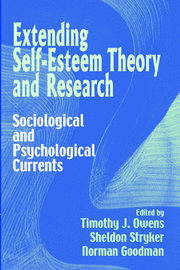Book contents
- Frontmatter
- Contents
- List of Contributors
- SECTION ONE THE FRAME
- SECTION TWO CONCEPTUAL AND METHODOLOGICAL ISSUES
- SECTION THREE SOCIAL AND LIFE COURSE CONTEXTS OF SELF-ESTEEM
- 7 Self-Esteem of Children and Adolescents
- 8 Failure of the Dream: Notes for a Research Program on Self-Esteem and Failed Identity in Adulthood
- 9 Self-Esteem and Work Across the Life Course
- 10 Comfort with the Self
- SECTION FOUR SELF-ESTEEM AND SOCIAL INEQUALITIES
- SECTION FIVE SELF-ESTEEM AND SOCIAL PROBLEMS
- Index
8 - Failure of the Dream: Notes for a Research Program on Self-Esteem and Failed Identity in Adulthood
Published online by Cambridge University Press: 24 November 2009
- Frontmatter
- Contents
- List of Contributors
- SECTION ONE THE FRAME
- SECTION TWO CONCEPTUAL AND METHODOLOGICAL ISSUES
- SECTION THREE SOCIAL AND LIFE COURSE CONTEXTS OF SELF-ESTEEM
- 7 Self-Esteem of Children and Adolescents
- 8 Failure of the Dream: Notes for a Research Program on Self-Esteem and Failed Identity in Adulthood
- 9 Self-Esteem and Work Across the Life Course
- 10 Comfort with the Self
- SECTION FOUR SELF-ESTEEM AND SOCIAL INEQUALITIES
- SECTION FIVE SELF-ESTEEM AND SOCIAL PROBLEMS
- Index
Summary
The title of this volume, the reader will recall, is Extending Self-Esteem Theory and Research: Sociological and Psychological Currents. In this chapter, I hope to foster that theme by outlining the elements of a nascent research program on self-esteem and failure to achieve or to be successful in realizing a central adult identity. In doing so, I will draw on psychological and sociological concepts and perspectives, giving special attention to important and relevant facets of the social context that I believe are useful to research on this generally neglected aspect of adult life.
The idea for this research program emerged as I was watching ballet at the Metropolitan Opera House in New York City. I noticed that several women in the corps de ballet were somewhat older than my conception of the typical ballerina. It struck me that most (if not all) of them started in ballet when they were much younger, and they probably saw themselves (their Dream) becoming a Principal Dancer. It seemed obvious, at least to me, that at their present age they were unlikely to be a Principal Dancer and would most likely continue in the corps de ballet until the end of their career. I wondered how they incorporated that change in their likely self-image into their identity and what effect it had on their self-esteem. I then thought of other social roles for which this issue would be relevant, and I mention some of these later in this chapter.
- Type
- Chapter
- Information
- Extending Self-Esteem Theory and ResearchSociological and Psychological Currents, pp. 157 - 176Publisher: Cambridge University PressPrint publication year: 2001



